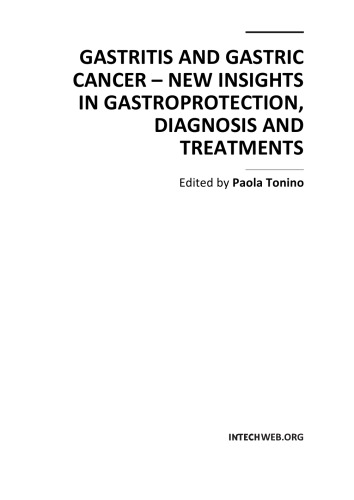مشاهده سبد خرید “Cutaneous Neural Neoplasms: A Practical Guide 2011” به سبد خرید شما اضافه شد.
Gastritis and Gastric Cancer: New Insights in Gastroprotection, Diagnosis and Treatments 2011
دانلود کتاب پزشکی گاستریت و سرطان معده: بینش های جدید در مورد محافظت، تشخیص و درمان معده
دسته: پزشکی, پزشکی بالینی, هپاتولوژی
ناشر:
BoD – Books on Demand
| نویسنده |
Paola Tonino |
|---|
| تعداد صفحهها |
310 |
|---|---|
| نوع فایل |
|
| حجم |
21 Mb |
| سال انتشار |
2011 |
89,000 تومان
دانلود ۳۰.۰۰۰ کتاب پزشکی فقط با قیمت یک کتاب و ۹۹ هزار تومان !
توضیحات
این کتاب مروری جامع بر مشارکت های دعوت شده از عفونت هلیکوباکتر پیلوری در گاستریت و سرطان معده است. بخش اول کتاب موضوعات مرتبط با پاتوفیزیولوژی سیستم دفاعی مخاط معده و گاستریت از جمله عملکرد محافظتی مخاط معده، اعصاب آوران حساس به کپسایسین و مسیر استرس اکسیداتیو درگیر در التهاب، آپوپتوز و اتوفاژی در هلیکوباکتر پیلوری را پوشش میدهد. گاستریت مرتبط فصل های بعدی به پاتوژنز مولکولی و درمان می پردازند که به نقش سلول های عصبی غدد درون ریز در بیماری معده، متیلاسیون DNA در عفونت هلیکوباکتر پیلوری و نقش آنتی اکسیدان ها و گیاه درمانی در بیماری های معده می پردازد. بخش آخر اثرات عوامل خطر سرطان مرتبط با عفونت هلیکوباکتر پیلوری را ارائه می کند. این فصلها در مورد آزمایش پپسینوژن سرم، جهشهای K-ras، تحرک سلولی و لیپوپلی ساکارید هلیکوباکتر پیلوری و همچنین نقش چندین ژن باکتریایی (cagA، cagT، vacA و dupA) بهعنوان فاکتورهای حدت در سرطان معده و گاستروکین بحث میکنند. 1 پروتئین در ایجاد سرطان
توضیحات(انگلیسی)
This book is a comprehensive overview of invited contributions on Helicobacter pylori infection in gastritis and gastric carcinogenesis. The first part of the book covers topics related to the pathophysiology of gastric mucosal defense system and gastritis including the gastroprotective function of the mucus, the capsaicin-sensitive afferent nerves and the oxidative stress pathway involved in inflammation, apoptosis and autophagy in H. pylori related gastritis. The next chapters deal with molecular pathogenesis and treatment, which consider the role of neuroendocrine cells in gastric disease, DNA methylation in H. pylori infection, the role of antioxidants and phytotherapy in gastric disease. The final part presents the effects of cancer risk factors associated with H. pylori infection. These chapters discuss the serum pepsinogen test, K-ras mutations, cell kinetics, and H. pylori lipopolysaccharide, as well as the roles of several bacterial genes (cagA, cagT, vacA and dupA) as virulence factors in gastric cancer, and the gastrokine-1 protein in cancer progression.




